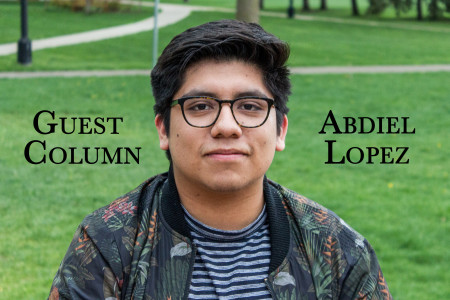Guest Column by Abdiel Lopez
lopezabd@grinnell.edu

My mother is a housekeeper and my father paints cars for a living. I have lived in a one-bedroom apartment my entire life in the heart of Los Angeles: Koreatown. Despite some financial shortcomings throughout my childhood, my parents made a collaborative effort to enroll me in elite public schools on the “Westside of L.A.” so that I could obtain the cultural and social capital that would eventually grant me a spot at an elite postsecondary institution like Grinnell. The academic industrial complex, especially in Los Angeles, merits a different article, but for now what I can say about it is that the stark inequality in the access and quality of the education children receive on the “Westside” is a lot better than those in South and East L.A. As such, I was privileged enough to take the public city transportation to and from my home to Brentwood-Pacific Palisades just to obtain a “better” education than the one I would have otherwise.
Growing up in these homogenously white spaces traumatized me, and I was not made aware of all the pain and the trauma until I came to Grinnell and found solace and refuge in theory. I turn to sociology when I need to make sense of the social world(s) I am constantly navigating. Activist and scholar bell hooks said it best in “Theory as liberatory practice”: “I wanted to make the hurt go away. I saw in theory then a location for healing.”
The hurt I experienced pre-Grinnell stemmed from my forced assimilation into Honors and Advanced Placement classes where I had to learn how to speak English with the right accent. I remember vividly presenting a project on Arizona and in the middle of my presentation I forgot how to pronounce Tucson. I pronounced it with a “k” instead of the silent “c.” In that moment, I was seen as different, as Other from the rest of my peers in my classroom. To this day, it fascinates me how much college students make fun of my mispronunciation of words I learned from reading literature at a young age and never remembered or thought to log on to a computer and hear the “right” linguistic pronunciation of words. Then again, right only became noticeable when I was told just how wrong I was.
When I came in and out of Latinx (a gender-inclusive term) spaces in high school I was always reminded of my difference. My inability to greet boys my age with what people in my AP classes referred to as the “ghetto handshake” made sure to let me know that I did not fit with people in my community. One time I told a group of acquaintances about playing my violin and remember being immediately dismissed with, “That shit is too white, bro.” It was this moment when notions of whiteness and Latinidad became obscure and foreign concepts that left me in the dark and continue to haunt me today.
When I finally stepped foot on the foreign land that I know as Grinnell, Iowa, I had no idea my past would become part of my present and future. My baggage of experiences would help other Latinxs position me as “the Other.” I tried — and continue to try — really hard to make friends with people in my community. Some greeted me with open arms and have continued to be part of my family to this day. Others have persisted in showing my difference to the world and myself.
I don’t align ideologically with the Student Organization of Latin@s (SOL) but my disillusionment and distance from SOL does not make me any less of a “Chicanx” or “Latinx” than someone who shows up to the weekly meetings. My critique of SOL stems from the fact that I do think it has a lot of potential to ameliorate the dialogue that has marginalized me on this campus. Nevertheless, for now, I am trying to search for ways to heal; so I turn to theory and put it in practice. This idea of self-empowerment, however, has been an issue for older Latinxs to understand. Consequently, they remind me of how their activist and leadership accomplishments have contributed to the Latinx community more visibly than the activism I do by staying alive on this campus and going to my classes. Messages like these tell me that I am not the right “kind” of Chicanx/Latinx.
Furthermore, the idea that there is a Latinx “culture” has expedited the process of producing a monolithic idea of what it means to be Latinx by essentializing experiences, and in that process robbing people of their lived experiences. As such, the word “culture” has been used to help subjugate Others even within my communities.
As I write this, I am reminded of how I exist in this space, how much hurt I have left in me to address and how much others are hurt as well. I do not know where my academic autobiography will lead me, but I know this: my constant search for my roots/routes is helping me create new theoretical journeys that are leading me to my liberation.

















































